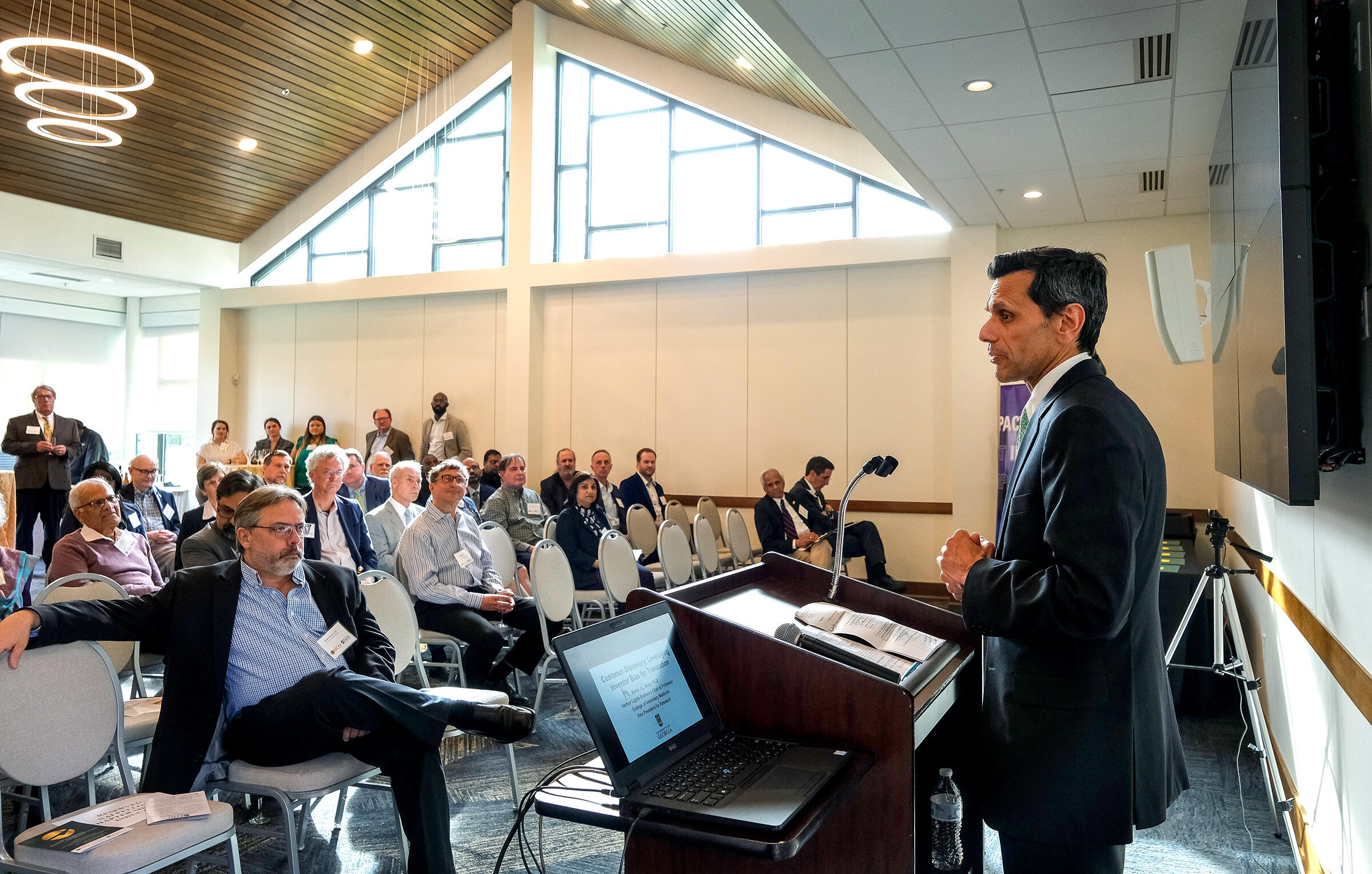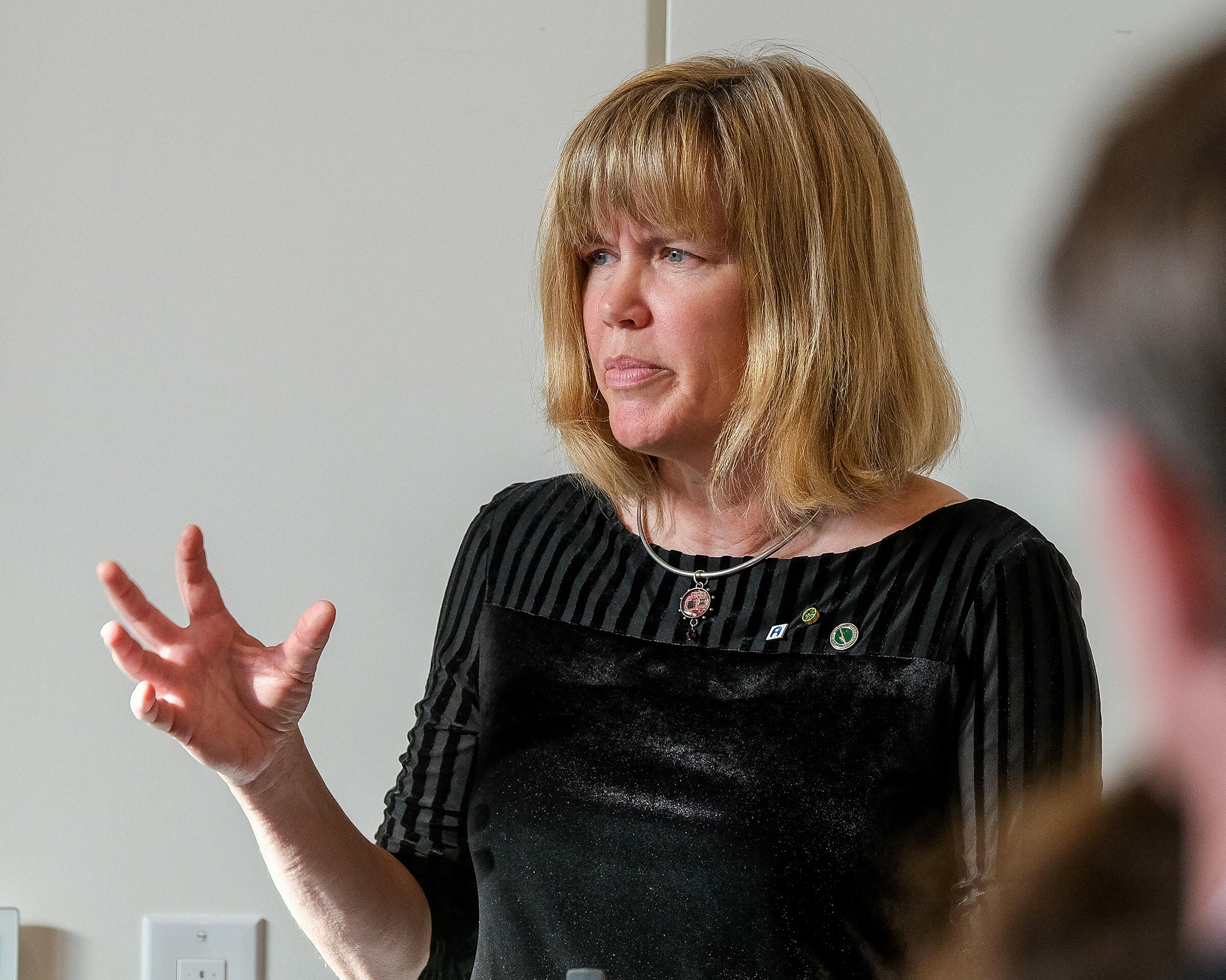
April 13, 2022
VCU chapter of National Academy of Inventors inducts eight faculty researchers
Share this story
Virginia Commonwealth University President Michael Rao, Ph.D., reminded a group of faculty inventors newly recognized for their innovations that when their creative ideas get to market, they help shape society and improve the quality of people’s lives.
Speaking to members of the VCU chapter of the National Academy of Inventors, Rao said that VCU’s research enterprise is growing stronger because there is a push for transdisciplinary research, a “culture of collaboration” that benefits people and changes lives.
“That's why you have a university,” said Rao. “Being able to work well with our colleagues and unlikely disciplines is essential to us.”
Rao spoke at the chapter’s induction ceremony Monday, where eight VCU faculty researchers were honored. To qualify for chapter membership, researchers must hold at least two U.S. patents. VCU’s Innovation Gateway, part of the Office of the Vice President for Research and Innovation, works with faculty researchers to protect and commercialize their inventions. In 2021, Innovation Gateway helped VCU faculty file 164 U.S. patents.
P. Srirama Rao, Ph.D., vice president for research and innovation, told the gathering that VCU patents not only drive Virginia’s economy, the research discoveries also have a tangible impact on the quality of life, economic health and welfare of society.
Rao, who is a member of the chapter and a senior member of the National Academy of Inventors, said that he and President Rao are committed to increasing VCU’s research investments.

“We want you to know that we will continue to support all your innovative ideas,” he said. “We have crazy ideas, we have bold ideas, and all of your daredevil ideas that you want to bring to us, we will find ways to support them so that you can move forward to the market.”
Barbara Boyan, Ph.D., the Alice T. and William H. Goodwin Jr. Dean of the VCU College of Engineering, introduced keynote speaker Karen Burg, Ph.D., University of Georgia’s vice president for research and innovation and a member of the National Academy of Inventors board of directors. Burg spoke of the importance of discovery and bringing products to the market that are useful to the broad community. She said that no matter how important the inventor thinks the product is, if it doesn’t meet the needs of the public, it doesn’t have a place in the marketplace.
“We should be biased about what we do. We should get enthusiastic and excited and have that kind of bias” that favors our inventions, Burg said. ”But we also have to balance that and integrate that with what the population needs.”
Paul Sanberg, Ph.D., D.Sc., president of the National Academy of Inventors, surprised guests at the ceremony with a virtual appearance, and urged VCU members to collaborate and connect with other academy members to help further research innovation and discovery.
The National Academy of Inventors is an organization of universities and governmental and nonprofit research institutes, with more than 4,000 individual inventor members and fellows worldwide.
The VCU 2022 inventor inductees are:
- Daren Chen, Ph.D., professor and Floyd D. Gottwald Sr. Chair of the Department of Mechanical and Nuclear Engineering in the College of Engineering, focuses on atmospheric and combustion aerosol and particulate emission control related to nanoparticles and nanotechnology, air pollution and indoor air-quality control, filtration and separation.
- William Dewey, Ph.D., professor and chair of the Department of Pharmacology and Toxicology in the School of Medicine, researches drug abuse disorders with a major emphasis on the underlying mechanisms of opioid tolerance and physical dependence.
- Jonathan Isaacs, M.D., professor and chair of the Division of Hand Surgery in the School of Medicine, who, in addition to his clinical and research efforts in hand and peripheral nerve surgery, heads the Orthopaedic Microsurgery Lab at VCU.
- Puru Jena, Ph.D., distinguished professor in the Department of Physics in the College of Humanities and Sciences, focuses on the structure and properties of nanoclusters and cluster assembled materials, nanotubes and nanowires and mono- and multilayered materials related to energy storage and electronic, magnetic and optical properties.
- Art Kellermann, M.D., senior vice president of VCU Health Sciences and CEO of VCU Health System, whose patents relate to a low-cost “manikin” solution to boost CPR training and education.
- Dana Selley, Ph.D., professor in the Department of Pharmacology and Toxicology in the School of Medicine, studies cell receptors that mediate the effects of psychoactive drugs, such as opiates, cannabinoids and antidepressants.
- Gary Tepper, Ph.D., professor and chair of the Department of Mechanical and Nuclear Engineering in the College of Engineering, studies advanced functional materials, such as nanomaterials, radiation detection, supercritical fluids, aerosols and air filtration.
- Erdem Topsakal, Ph.D., professor and chair of the Department of Electrical and Computer Engineering in the College of Engineering, researches medical applications for applied electromagnetics.
Subscribe to VCU News
Subscribe to VCU News at newsletter.vcu.edu and receive a selection of stories, videos, photos, news clips and event listings in your inbox.







